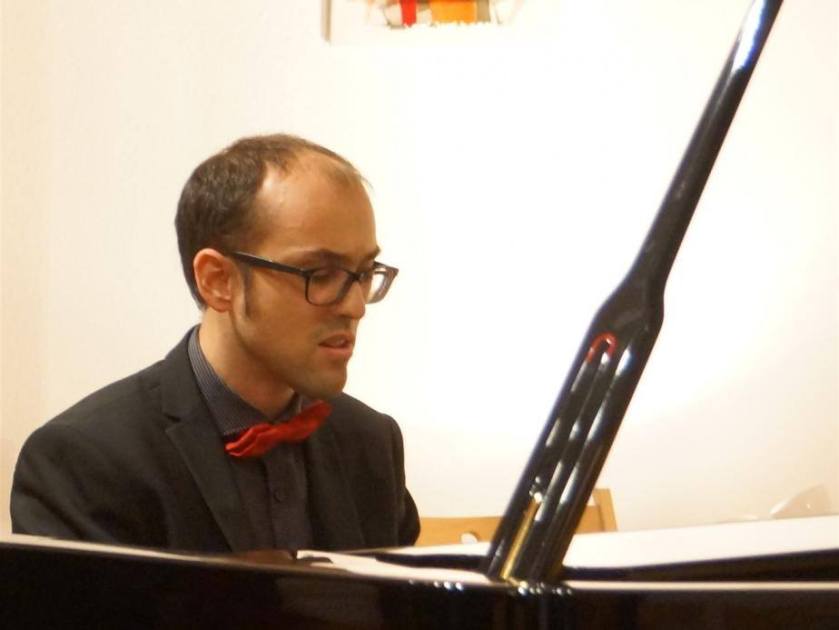Who or what inspired you to pursue a career in music?
As long as I can remember I was totally in love with music. As a kid I was fascinated by the piano as soon as I saw someone playing it on TV. When my parents were visiting friends and they had a piano in their house I would always go there and experiment with it for most of the visit. In elementary school our teacher would play for us kids some works by Mozart and from that moment I could not stop listening to them. I just wanted to play those works on the piano. So that was how I got started.
Who or what have been the most important influences on your musical life and career?
In recent years I was very inspired by the pianist Michael Houstoun from New Zealand who recorded the thirty-two Beethoven Sonatas after being diagnosed with focal dystonia in his right hand: he taught me that there is a way to get through it.
In a broader sense I get also inspirations from people who just do not give up. It can be a tennis player who fights to reverse a match, a ski racer who comes back after an injury or my dog with three legs who runs as she has four.
What have been the greatest challenges of your career so far?
In my case it was being diagnosed with focal dystonia in my left hand in 2012.
Which performances/recordings are you most proud of?
I am actually quite proud of the current CD. I recorded it after seven years I was diagnosed with focal dystonia.
Which particular works do you think you perform best?
I think it changes from time to time. At the moment I am quite in love with Schubert and approaching his last sonatas. I am also fascinated by the late works of Beethoven. I love the Bagatelles op.126. I also feel very comfortable with Schumann. I just recently learnt Schumann’s Humoresque. I also think that I am very much at home with the expressiveness Berg Sonata.
How do you make your repertoire choices from season to season?
I try to be as spontaneous as possible. When I study a new work, I must get a connection to it at have an idea where I want to go with it. I like to play new works for friends at home before I perform them in public.
Do you have a favourite concert venue to perform in and why?
I don’t really have a favourite venue. Every venue has its challenges. But I really like to play in more intimate settings.
What is your most memorable concert experience?
As a listener it was a concert with Murray Perahia which he gave in Ann Arbor. As a player I think of my performance of the first Mendelssohn Piano concerto at the Casalmaggiore festival which was a really wild ride with the festival orchestra.
As a musician, what is your definition of success?
I think the definition of success is for every musician something very individual. For me success means when I can reach people with my playing. Or when I get these rare moments of perfection where just everything worked.
What do you consider to be the most important ideas and concepts to impart to aspiring musicians?
Give yourself time to grow. Also allow yourself to fail. Do not expect that the path is just going in one direction!
Where would you like to be in 10 years’ time?
I would quote John Lennon: “Life is what happens to you while you’re busy making other plans“. So, I am very cautious with predictions.
What is your idea of perfect happiness?
My idea would be to be so satisfied and with peace with oneself! Sounds a little bit after Buddhism?
What is your most treasured possession?
The friendship of my dog Lisa who has only three legs. She was adopted from an animal shelter organization.
What is your present state of mind?
I think and hope that I have an open mind and to keep my curiosity towards life in general.
Andreas Eggertsberger’s album Dystonia, featuring Schubert’s Piano Sonata No. 20 in A, and Schumann’s Kreisleriana, is released on 7 October 2019
The pianist Andreas Eggertsberger was considered a prodigy in his early years, gave his first concert at the age of 12 and completed piano studies at the Bruckner Conservatory in Linz at the age of just 15. Further studies, an international career and many awards followed, before Eggertsberger finally received the diagnosis of “focal dystonia” after a long search for causes of his diminishing left-hand play in 2012. Focal dystonia is the same neurological disease that was probably for the first time documented with Robert Schumann. The long-term therapy required a complete re-learning of the piano, meticulous exercises to bring rehearsed movement back under control. Five years later, Andreas Eggertsberger sees himself healed and returns to the concert podium
